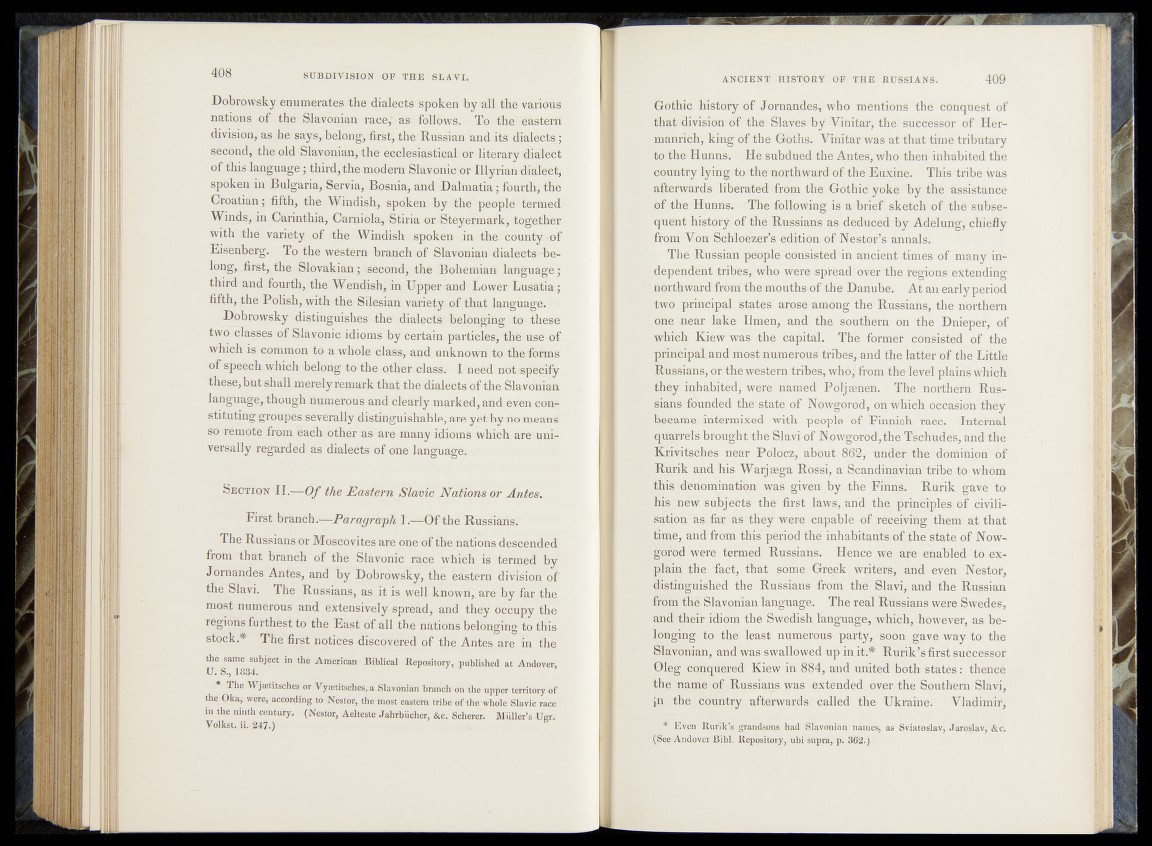
Dobrowsky enumerates the dialects spoken by all the various
nations of the Slavonian raoeyas -'follows. To the" eastern'
di|||i< i|r as he says-,*belong, first, the Russian and itsnMtieetsj
Second,, the old .Slavonian, the ecclesiastical» or literary dialect
of this.language; third, the modern Slavonic or IllyriandMee-t,
spoken in Bulgaria, Servia, Bosnia, and Dalmatia; fourth, the
Croatian; fifth, the Windish, spoken by the people termed
Winds, in Qarinthia, Garniola, Stiria or Bteyermark, ;tpgether
with the variety of the -Windish spoken ah'the county-» of
Eisenberg. To the western branch of Slavonian dialects^be-
long^ first, the Slovakian; -second, the Bohemian language.;
thirchapd fourth, the Wendish, in Upper'and Lower- Lusatia;
fifth, vthe"Polish, with the Silesian variety of that language. >
Dobrowsky distinguishes the dialects belonging to j-ithesb
two clashes of Slavonic, idio-msby certain particfes; thbusUbf
which is common to a whole class, and unknown to the forms
of speech which- belong to the other class. I-need not'spccify
these, but shall merely remark that t he dialeets of the Slavonian
language, though numerous and clearly marked, and even oorlr
sti tuting groupesseverally distinguishaMeyare-yetby -no means'
so remote from each other as are many idioms which are'universally
regarded as dialeets of one language.« v-
S e c t io n II.— O f the Eastern Slavic Nations or Antes.
First branch:— Paragraph 1 .^O fith e Russians:*
The Russians or Muscovites are one of the nations descended
from that branch of the Slavonic race which is termed by
Jornandes Antes, and by Dobrowsky, the eastern division o^
the Slavi. The Russians, as it is well known, are by far the
most numerous and extensively spread, and they occupy the
regions furthest to the East of all the nations belonging to this
stock* The first notices discovered of the Antes are in the
same subject in the American Biblical Repository, published at Andover,
U. S., 1834.
j§ The Wjatitsches or Vyastitsches, a Slavonian branch on the upper territory of
the Oka, were, according to Nestor, the most eastern tribe of the whole Slavic race
in the ninth century. (Nestor, Aelteste Jahrbiicher.&c. Scherer. Muller's Ucr.
Volkst. ii. 247.)
Gothic history of Jornandes, who mentions the conquest of
that di.vistbn'of the Slaves by Vinitar, the?" successor of Her-
manrich, kitja^bf the Goths.- Vinitar 'was at that time tributary
fifithe Hunns. He subdued-the Antes; who then inhabited the
Country »lying ib the northward of the Euxine. This tribe was
afterwards liberate®from the Gothic' yoke by the assistance
'ë f the Hunnsif ïThe following is a-brief sketch of the; subsequent
history'.ofi th’e Russians ^'deduced by Adelung; chiefly
from Von-SM om e v s editioïtëbf Nestor-V anna-1#
* The RusSian^pepplé Consisted in ancient times of many independent
tribfesjiwBb were spread over thfe regions extending
nbrthward from the mouths of the Danube- • At ail early period
two principal- states ,arpse among the Russians, the northern
one near lake Ilmen, and the? southern,‘on'the Dnieper, of
which* Kiew was the-capital. The':former ' consisted of the
principal and mosbnumeroUs tribes, and the latter bf the Little
Rhssiansyorthe western tribes, who/from thelblél plains which
they, inhabited, were named Poljaenen. Thë; northern Russians
founded the state -óf Nöwgörddj'on which occasion they
became intermixed with' péople^ëf Finnish face. Internal
quarrels brought thfenSlavi of Nowgorod,the T scbud^, and thé
Krivifsches near Polocz, about 862, under the dominion of
Rurik and his Warjsega-Rossi, a Scandinavian tribe to whom
this denomination was given by the Finns. Rurik gave to
his new subjects the fifst laws, and the principles of civilisation
as far as they were capable of receiving them at that
time, and from this period the inhabitants, of the state of Now-
gorod were termed Russians Hence we are enabled to explain
the fact, that some Greek writers, and even Nestor,
distinguished the Russians from the Slavi, and the Russian
from the Slavonian language. The real Russians were Swedes,
and their idiom the Swedish language, which, however, as belonging
to the least numerous party, soon gave way to the
Slavonian, and was swallowed up fit it.* Rurik’s first successor
Oleg conquered Kiew in 884, and united both states: thence
the name of Russians was extended over the Southern Slavi,
in the country afterwards called the Ukraine. Vladimir,
* Even Rurik’s grandsons bad Slavonian names, as Sviatoslav, Jaroslav, &c.
(See Andover Bibl, Repository, ubi supra, p., 362.)